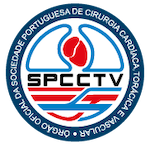ECMO POST-CARDIOTOMY, A SINGLE CENTRE EXPERIENCE
DOI:
https://doi.org/10.48729/pjctvs.9Abstract
Objectives: Our objective was to examine the results of ECMO post cardiotomy in Centro Hospitalar Universitário S. João (CHUSJ).
Methods: Between 2011 and 2019, 13 patients were cannulated for refractory cardiogenic shock post-cardiotomy; 8 (61,5%) male and 5 (38,5%) female. Patients under 18 years old were excluded. Data was collected from hospital archives concerning preoperative comorbidities, open-heart surgery procedure, dates of ECMO cannulation and decannulation, postoperative complications, hospital mortality and cause of death. Follow-up was obtained by review of the last outpatient observation. The outcomes investigated were hospital mortality and survival at 12, 36 and 60 months.
Results: After a median ECMO-VA therapy of 6 days (1-16 days), 7 (53,8%) patients were successfully decannulated; from these 2 succumbed from stroke and septic shock, one is still in intermediate care convalescing steadily and 4 were discharged. Overall 8 (61,5%) patients died. 5 (38,5%) survived, 4 were discharged home and 1 is still in intermediate care. Survival (after discharge) at 12, 36 and 60 months was respectively 25%, 16,7% and 8,3%. Regarding postoperative complications, reoperation for bleeding was necessary in 5 (38.5%), stroke was diagnosed in 2 (15,4%), dialysis in 6 (46,2%), leg ischemia affected 5 (38,5%) and mediastinitis occurred in 1 (7,7%).
Conclusions: VA ECMO saves a life in each three patients suffering from refractory cardiogenic shock after cardiac surgery. Despite risks associated with advanced cardiopulmonary support, survivors maintain good health condition.
Downloads
References
Baldetti L, G. M. (2020). Strategies of left ventricular unloading during VA-ECMO support: a network meta-analysis. Int J Cardiol., pp. 312:16-21.
Bardia A, S. R. (2018). Postcardiotomy Venoarterial Extracorporeal Membrane Oxygenation (VA ECMO) in Adult Patients - Many Questions, Few Answers, and Hard Choices. J Cardiothorac Vasc Anesth. , pp. 32(3):1183-1184. .
Biancari F, D. M. (2020). Multicenter study on postcardiotomy venoarterial extracorporeal membrane oxygenation. J Thorac Cardiovasc Surg, pp. 159(5):1844-1854.
Biancari F, P. A. (2018). Meta-Analysis of the Outcome After Postcardiotomy Venoarterial Extracorporeal Membrane Oxygenation in Adult Patients. Cardiothorac Vasc Anesth, pp. 32(3):1175-1182.
Biancari F, S. D. (2019). Postcardiotomy Venoarterial Extracorporeal Membrane Oxygenation in Patients Aged 70 Years or Older. Ann Thorac Surg, pp. 108(4):1257-1264.
Di Mauro M, L. R. (2018). Time is your best friend, but it soon becomes your worst enemy: The conflict of venoarterial extracorporeal membrane oxygenation in cardiac surgery. J Thorac Cardiovasc Surg, pp. 155(6):2477-2478.
Ellouze O, A. X. (12 de Mar de 2020). Risk Factors of Bleeding in Patients Undergoing Venoarterial Extracorporeal Membrane Oxygenation. Ann Thorac Surg, pp. S0003-4975(20)30362-3.
Le Guennec L, C. C. (2018). Ischemic and hemorrhagic brain injury during venoarterial-extracorporeal membrane oxygenation. Ann Intensive Care, p. 8(1):129.
Mariscalco G, S. A. (2019). Peripheral versus central extracorporeal membrane oxygenation for postcardiotomy shock: Multicenter registry, systematic review, and meta-analysis. J Thorac Cardiovasc Surg, pp. S0022-5223(19)32376-1.
Meani P, M. M. (2019). Long-term survival and major outcomes in post-cardiotomy extracorporeal membrane oxygenation for adult patients in cardiogenic shock. Ann Cardiothorac Surg, pp. 8(1):116-122.
PL, M. (2019). The Role of Venoarterial Extracorporeal Membrane Oxygenation in Postcardiotomy Cardiogenic Shock. Crit Care Nurs Clin North Am, pp. 31(3):419-436.
Wang L, W. H. (2018). Clinical Outcomes of Adult Patients Who Receive Extracorporeal Membrane Oxygenation for Postcardiotomy Cardiogenic Shock: A Systematic Review and Meta-Analysis. J Cardiothorac Vasc Anesth. , pp. 32(5):2087-2093.
Xie A, F. P. (2019). Left ventricular decompression in veno-arterial extracorporeal membrane oxygenation. Ann Cardiothorac
Surg., pp. 8(1):9-18.





